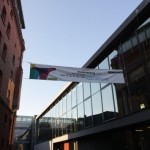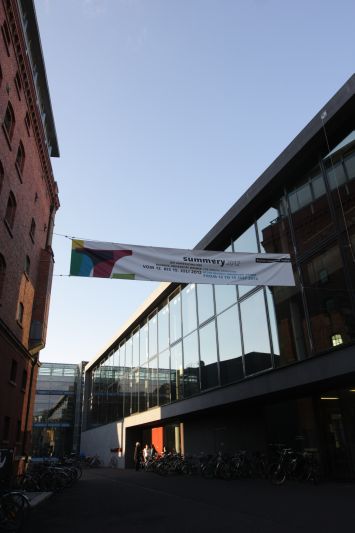When we mentioned it last year it was just intended as a cheap pun. But slowly we can see a lot of sense in changing the name of the annual end of year exhibition at the Bauhaus University Weimar to Autumnery.
For as with Summaery 2011, Summaery 2012 wasn’t.
And although we had the feeling that this years show was less extensive than last years, we still found plenty to distract us from the unseasonal weather.
Among the highlights for us were the results of the classes “Falter” which challenged students to create products through folding, bending, arching etc, not processes that necessarily always create good products but the results presented certainly reinforced the value of such processes in product design and “ex und hopp” which looked at increasing the lifecyles of products. The highpoint in “ex und hopp” was probably Juusto by Josephine Peterknecht a device for turning “old” milk into cheese and which we’d really like to see in action as, and despite reading the brochure, we still don’t really get it. But love the concept.
Regular readers will be aware that there is one room in the Weimar campus complex that always contains a presentation that mildly disappoints us.
Was would now be the correct verb form.
Having taken the hint from our constant whinging, that particular room wasn’t open this year; and so the mildly disappointing show was forced to move across the courtyard.
For us the “Hygiene – Händewaschen hilft, nützt aber nichts!” class looking at improving hospital hygiene missed the point a little. Now we know the students had specialist assistance from Jena Uni Hospital and we don’t want to pick a fight with microbiologists…..
…..although that said, there is one member of the (smow)blog team who almost got into a brawl once over the generic name of the bacteria that causes the bubonic plague. And so, in that tradition.
We can well believe that those bacteria which cause infections are mainly transported by the hands. But the hands aren’t the cause. They are the mechanical transportation.
Classic product design in the sense of objects to make disinfecting your hands easier is therefore no long term solution – except of course for the financial worries of the global disinfectant industry – as it doesn’t tackle any problem. Reducing bacterial spread is a process design issue, and while there were admittedly a couple of nice attempts at influencing staff behaviour for the better, for us too much of the exhibition focused on making sure medical staff always had a ready supply of disinfectant. Which we felt was a shame because it is an area where designers have a lot to offer.
Although that said reducing infection is ultimately a medical question, a question of how hospitals work and if hospitals shouldn’t use less drugs and perform less operations. And indeed admit fewer patients.
As a society we medicine too much, and in terms of remaining fit and healthy, less is, as any design student should know, more.
Elsewhere the 2012 Diploma show contained one and half, possibly one and two half really good projects, the rest just not really floating our boat, but more on that later; the results of the class “Lernen Kochen und Essen” exploring how to improve and optimise the experience and pedagogic value of school meals produced a couple of outstanding responses; and the now traditional exhibition of workplace solutions contained an intoxicating mix of the sublime and ridiculous. But hey, that’s what such courses are all about, setting the students a brief and seeing what they make of and with it.
A special mention must also go to the band who played the Rolling.Stage.Solar on the early part of the Thursday evening. We’re not sure what they were called, they did however make one of the most gorgeous and infectious sounds we have heard in a very, very long time. Top notch!
The Bauhaus University Weimar’s principle focus is architecture and art, product design has an important but not central role in the institution. A situation which means that while the majority of what is on show is interesting, it’s not something we can really get excited about. Room upon room of architectural models and sketches are undoubtedly important, but not something we want to spend too long trying to decipher. Especially when we neither know nor particularly care about the context of the object/area involved.
However it is exactly this focus away from our principle focus that always makes a visit to Summaery fascinating, because we do find ourselves being forced to continually reappraise situations and are invariably led down new paths of thought. And that is why we always make the effort to go to Weimar.
That and the fact that it doesn’t matter what the weather is like during our visit, heading back to Leipzig we are always treated to the most fantastic sunsets. The sort of sunset that truly reaffirms your faith in the world and makes you feel you can take on anything the future may hold for you.
Summaery 2012 at Bauhaus University Weimar can be viewed until Sunday July 15th 2012.
Below a few impressions from Summaery 2012 at Bauhaus University Weimar.

